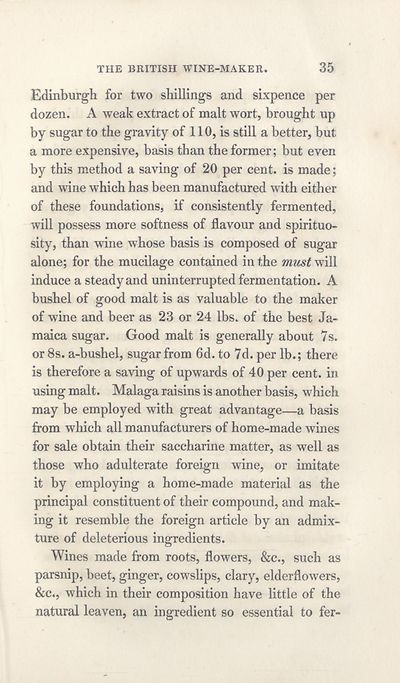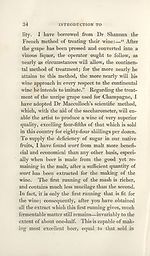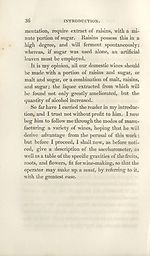Download files
Complete book:
Individual page:
Thumbnail gallery: Grid view | List view

THE BRITISH WINE-MAKER. 35
Edinburgh for two shillings and sixpence per
dozen. A weak extract of malt wort, brought up
by sugar to the gravity of 110, is still a better, but
a more expensive, basis than the former; but even
by this method a saving of 20 per cent, is made;
and wine which has been manufactured with either
of these foundations, if consistently fermented,
will possess more softness of flavour and spirituo-
sity, than wine whose basis is composed of sugar
alone; for the mucilage contained in the must will
induce a steady and uninterrupted fermentation. A
bushel of good malt is as valuable to the maker
of wine and beer as 23 or 24 lbs. of the best Ja¬
maica sugar. Good malt is generally about 7s.
or 8s. a-bushel, sugar from 6d. to 7d. per lb.; there
is therefore a saving of upwards of 40 per cent, in
using malt. Malaga raisins is another basis, which
may be employed with great advantage—a basis
from which all manufacturers of home-made wines
for sale obtain their saccharine matter, as well as
those who adulterate foreign wine, or imitate
it by employing a home-made material as the
principal constituent of their compound, and mak¬
ing it resemble the foreign article by an admix¬
ture of deleterious ingredients.
Wines made from roots, flowers, &c., such as
parsnip, beet, ginger, cowslips, clary, elderflowers,
&c., which in their composition have little of the
natural leaven, an ingredient so essential to fer-
Edinburgh for two shillings and sixpence per
dozen. A weak extract of malt wort, brought up
by sugar to the gravity of 110, is still a better, but
a more expensive, basis than the former; but even
by this method a saving of 20 per cent, is made;
and wine which has been manufactured with either
of these foundations, if consistently fermented,
will possess more softness of flavour and spirituo-
sity, than wine whose basis is composed of sugar
alone; for the mucilage contained in the must will
induce a steady and uninterrupted fermentation. A
bushel of good malt is as valuable to the maker
of wine and beer as 23 or 24 lbs. of the best Ja¬
maica sugar. Good malt is generally about 7s.
or 8s. a-bushel, sugar from 6d. to 7d. per lb.; there
is therefore a saving of upwards of 40 per cent, in
using malt. Malaga raisins is another basis, which
may be employed with great advantage—a basis
from which all manufacturers of home-made wines
for sale obtain their saccharine matter, as well as
those who adulterate foreign wine, or imitate
it by employing a home-made material as the
principal constituent of their compound, and mak¬
ing it resemble the foreign article by an admix¬
ture of deleterious ingredients.
Wines made from roots, flowers, &c., such as
parsnip, beet, ginger, cowslips, clary, elderflowers,
&c., which in their composition have little of the
natural leaven, an ingredient so essential to fer-
Set display mode to:
![]() Universal Viewer |
Universal Viewer | ![]() Mirador |
Large image | Transcription
Mirador |
Large image | Transcription
| Antiquarian books of Scotland > Occupations > British wine-maker, and domestic brewer > (73) |
|---|
| Permanent URL | https://digital.nls.uk/126000797 |
|---|
| Description | Thousands of printed books from the Antiquarian Books of Scotland collection which dates from 1641 to the 1980s. The collection consists of 14,800 books which were published in Scotland or have a Scottish connection, e.g. through the author, printer or owner. Subjects covered include sport, education, diseases, adventure, occupations, Jacobites, politics and religion. Among the 29 languages represented are English, Gaelic, Italian, French, Russian and Swedish. |
|---|

